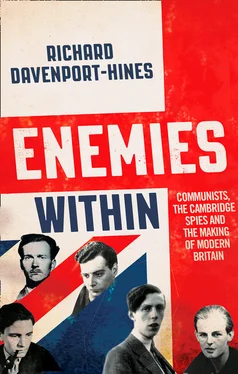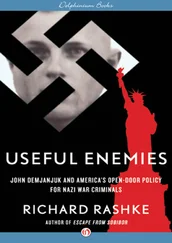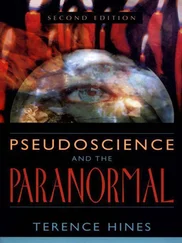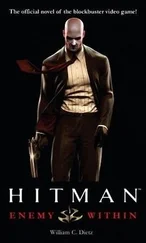The eminent illegal Walter Krivitsky, codenamed GROLL, was briefly charged with delivering the photographic film for use on King’s material in London. Theodore Maly, who succeeded Krivitsky in London, reported to Moscow Centre that King wished to ‘rid the world of poverty, hunger, war and prison’, but was not left-wing. Socialism meant ‘the terrors of Bolshevism, it is chaos, the power of the mob, Jews and endless bloodshed’, he told Maly. ‘I am against Fascism but if here, in this country, I had to choose between Sir Oswald Mosley and British Labourites, I would choose the former, for the latter logically lead to Bolshevism.’ He assessed Hitler as ‘a maniac but an honest person’ who had saved Germany from the Reds. The English aristocracy was ‘good for nothing, in the first place because it was English, and in the second because it is mixed with Jews and other lower classes’. The Irish and Scottish nobility was however ‘clear of foreign taint, and it has preserved its race’. King, like Oldham, was a mercenary who needed money, and had no interest in communism. He was conceited like Oldham too, but had stronger nerves: he enjoyed the sense of superior but secret privileges that accompanied his hidden life; he did not get rattled by the dangers of discovery and launch himself into panicky binges. 29
King’s influence may have been world-changing. Donald Cameron Watt believed that the material supplied by King in July and August 1939 to his Soviet controller, reporting on the Anglo-French tripartite negotiations with Russia for a pact against Germany, was leaked by Moscow in a selective fashion to Berlin. The intelligence gobbets given to Germany were among the enticements that led Berlin into the Nazi–Soviet non-aggression pact of August 1939. 30
Krivitsky was the link joining Oldham and King to Maclean and Philby. His original name was Samuel Ginsburg. He was Jewish and Russian-born, with a Polish father, a Slav mother and a Latvian wife who was a dedicated Bolshevik. In youth he was an active Vienna socialist while training as an engineer. After the launch of the illegal system in 1925, he became illegal rezident in The Hague, under the alias of Martin Lessner, an Austrian dealer in art and rare books. His house was furnished with stark minimalist modernity as visible support for his cover. He had enough culture to sustain the mask of connoisseurship. From the Netherlands Krivitsky directed much of the espionage in Britain. He became convinced of the insanity of Nikolai Yezhov, whom Stalin appointed chief of the NKVD in 1936 with the remit to purge the party. In 1937 Ignace Reiss @ Poretsky, the Paris-based illegal who was Krivitsky’s boon comrade, protested against the Great Terror and denounced Stalin. As a test of Krivitsky’s fealty, Moscow ordered him to liquidate Reiss. He refused, was summoned to Moscow for retribution and fled for his life to the USA.
It was at this time that a Cambridge luminary, the novelist E. M. Forster, wrote a credo that has been lampooned, truncated in quotation and traduced by subsequent writers. His remarks in their entirety carry a message of individualism, conscientious judgement and anti-totalitarianism that might have been a text for Whitehall values in the 1930s. ‘One must be fond of people,’ said Forster, ‘and trust them if one is not to make a mess of one’s life, and it is therefore essential that they should not let one down. They often do.’ Writing in 1939, when totalitarian nationalism was rampant, Forster continued: ‘Personal relations are despised today. They are regarded as bourgeois luxuries, as products of a time of fair weather which is now past, and we are urged to get rid of them, and to dedicate ourselves to some movement or cause instead. I hate the idea of causes, and if I had to choose between betraying my country and betraying my friend, I hope I should have the guts to betray my country.’ Krivitsky had the guts. 31
The Americans were more obtuse about Krivitsky’s defection even than Dunderdale had been with Bessedovsky’s. He reached New York with his wife and children on the liner Normandie on 10 November 1938 (travelling under his real name of Ginsburg). Immigration officials rejected the family’s entry on grounds of insufficient funds. He was eventually released on bail provided by his future writing collaborator Isaac Don Levine, who had been born in Belarus, finished high school in Missouri and worked as a radical journalist but had become hostile to communist chicanery. Krivitsky funded his American life by producing articles and an autobiography which were ghosted by Levine and sold by Paul Wohl, a German-Jewish refugee who had worked for the League of Nations and was trying to scratch a living as a New York literary agent and book reviewer. In an article of February 1939 Krivitsky predicted the Nazi–Soviet pact seven months before it was agreed.
Roosevelt’s Secretary of State Cordell Hull had relinquished his department’s responsibility for monitoring communists and fascists to the Federal Bureau of Investigation in 1936: ‘go ahead and investigate the hell out of those cocksuckers’, he had told its chief J. Edgar Hoover. This decision left the FBI with the incompatible tasks of policing crimes that had already been committed and of amassing secret intelligence about future intentions and possible risks to come. In practice, the Bureau concentrated on law enforcement and criminal investigation rather than intelligence-gathering and analysis. This bias and Hoover’s insularity meant that there was more interest in pursuing Krivitsky for passport fraud than in extracting intelligence from him. 32
After a nine-month delay, on 27 July 1939 a special agent of the FBI questioned Krivitsky for the first time in Levine’s office in downtown New York. Their exchanges were too crude to be called a debriefing. The debriefing of defectors is slow-moving at the start: character must be assessed, trust must be gained, affinities must be recognized and motivations must be plumbed. Only then, when the participants are speaking rationally and with the semblance of mutual respect, can reliability be gauged and evasions be addressed. Perception, patience and tact are needed to overcome psychological resistance and to elicit information that can be acted on. But the FBI agent did not engage in preliminary civilities to reach some affinity with his subject. Instead he fired narrowly focused questions about Moishe Stern @ Emile Kléber @ Mark Zilbert, who was believed to have run a spy ring in the USA. Krivitsky was diverted from volunteering information on other matters. When his replies contradicted the conclusions drawn in previous FBI investigations, or expressed his certainty that Stern had been purged, the special agent concluded that he was ill-informed, wrong-headed and obstinate. The FBI agent did not listen with an open mind; he would not revise his own presuppositions. Hoover dismissed Krivitsky as a liar.
Krivitsky’s memoirs In Stalin’s Secret Service had an ungrateful reception from reviewers: ‘his words are those of a renegade and his mentality that of a master-spy’, Foreign Affairs warned in response to his indictment of Stalinism. Communist sympathizers were especially hostile: Malcolm Cowley in New Republic decried the fugitive from Stalin’s hit-squad as ‘a coward … a gangster and a traitor’ to his friends, and elsewhere labelled him ‘a rat’. Edmund Wilson called Cowley’s review ‘Stalinist character assassination’; and certainly such tendentious pieces harmed Krivitsky’s credibility. The book was nevertheless read by Whittaker Chambers, a former courier for a communist spy ring in Washington who had turned against the Stalinist system of deceit, paranoia and executions, and had gone into hiding after being summoned to Moscow for purging. Later he was to write his own memoir, Witness , in which he presented the object of a secret agent’s life as humdrum duplicity. ‘Thrills mean that something has gone wrong,’ he wrote. ‘I have never known a good conspirator who enjoyed conspiracy.’ Chambers contacted Levine, who introduced him to Krivitsky. After the shock of the non-aggression pact signed by Nazi Germany and Soviet Russia on 23 August, Levine asked Assistant Secretary of State Adolf Berle to meet Chambers and hear his information. 33
Читать дальше












